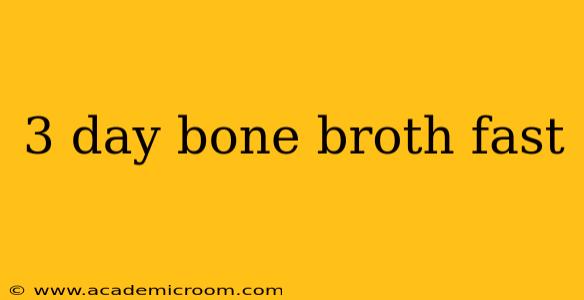The 3-day bone broth fast is gaining popularity as a way to cleanse the body, improve gut health, and potentially support weight loss. But is it right for everyone? This comprehensive guide explores the potential benefits and risks of a 3-day bone broth fast, addressing common questions and providing practical advice for those considering this dietary approach.
What is a Bone Broth Fast?
A bone broth fast, unlike a complete water fast, involves consuming only bone broth for a specified period, typically ranging from a few days to several weeks. Bone broth, a nutrient-rich liquid made by simmering animal bones, contains collagen, gelatin, minerals, and amino acids. Proponents believe these nutrients support gut health, reduce inflammation, and promote overall well-being. A 3-day bone broth fast is a shorter version of this, often used as a gentle introduction to longer fasts or as a standalone cleanse.
Is a 3-Day Bone Broth Fast Safe?
While generally considered safer than a water fast due to the nutritional content of bone broth, a 3-day bone broth fast is not without potential risks. It's crucial to consult your doctor before starting any fast, especially if you have underlying health conditions like diabetes, kidney disease, or eating disorders. Furthermore, individuals taking certain medications should discuss the implications of fasting with their physician.
Frequently Asked Questions about 3-Day Bone Broth Fasts
Here we address some common questions surrounding the 3-day bone broth fast, based on common search queries:
What are the benefits of a 3-day bone broth fast?
Potential benefits often cited include:
- Improved Gut Health: The gelatin and collagen in bone broth can soothe the gut lining and support a healthy gut microbiome.
- Reduced Inflammation: Some studies suggest bone broth's components may have anti-inflammatory properties.
- Increased Energy Levels (Initially): While this is subjective, some individuals report increased energy during the initial stages of a fast. This effect usually diminishes as the fast progresses.
- Weight Loss (Temporary): A short-term fast like this can lead to temporary weight loss due to water weight and glycogen depletion. Sustainable weight loss requires a holistic approach to diet and lifestyle.
- Improved Sleep: Anecdotally, some report improved sleep quality after a short fast.
It's important to note that more robust scientific evidence is needed to confirm these claims definitively.
What are the side effects of a 3-day bone broth fast?
Potential side effects can include:
- Headaches: Common during the initial stages of fasting as your body adjusts.
- Fatigue: Energy levels often fluctuate during a fast.
- Constipation: Reduced food intake can lead to slower digestion.
- Lightheadedness: Especially if you're not properly hydrated.
- Nutrient Deficiencies (Long-term Fasts): While bone broth provides some nutrients, a prolonged fast can lead to deficiencies if not properly planned and monitored. A 3-day fast is generally less likely to cause significant deficiencies, but it's still important to be aware.
How do I prepare for a 3-day bone broth fast?
Preparation is key. Begin by gradually reducing your food intake in the days leading up to the fast. This helps to ease your body into the transition. Ensure you're well-hydrated, and focus on consuming nutrient-dense foods. You should also choose high-quality bone broth made from organic, pasture-raised animals.
What kind of bone broth should I use?
Opt for homemade bone broth whenever possible, as this allows you to control the ingredients and ensure high quality. If making your own isn't feasible, choose a reputable brand with minimal additives. Avoid broths high in sodium.
What can I do to make the 3-day bone broth fast easier?
- Stay Hydrated: Drink plenty of water throughout the day.
- Electrolyte Support: Consider adding electrolytes to your bone broth or water to minimize potential side effects.
- Mindfulness and Rest: Prioritize rest and relaxation during the fast. Engage in calming activities like meditation or yoga.
- Listen to Your Body: If you experience any severe discomfort, stop the fast immediately.
What should I eat after a 3-day bone broth fast?
Slowly reintroduce food after the fast. Start with easily digestible foods like fruits, vegetables, and light soups, gradually increasing your food intake over several days. Avoid processed foods, sugar, and caffeine initially.
Disclaimer: This information is for educational purposes only and should not be considered medical advice. Consult your healthcare provider before undertaking a 3-day bone broth fast, especially if you have pre-existing health conditions or are taking medication. Individual experiences with fasting vary considerably.
